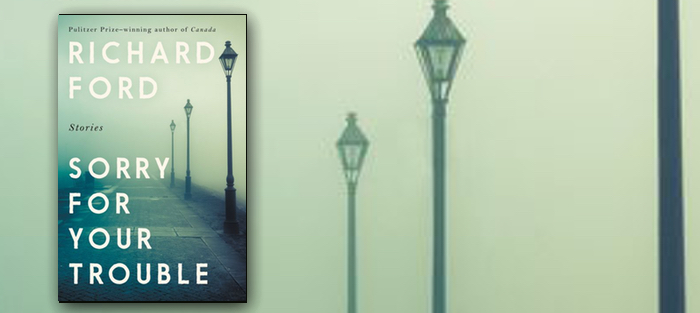Richard Ford knows a thing or two about loneliness. From his earliest stories in the now-classic Rock Springs to the nine stories that make up his latest collection, Sorry for Your Trouble (Ecco), he has kept a running tally of all its varied forms, and how it follows us through every station of life. And while the places and circumstances in which his characters find themselves may have changed over the years, that essential loneliness, in love and on its margins, has not.
Ford has long been something of a roamer, both in life and in his fiction, and that roaming and the restlessness which drives it are front and center in Sorry for Your Trouble. Ireland, France; the coasts of Louisiana or Maine; Jackson, Mississippi—there’s no telling where we might end up. In “Nothing to Declare,” we find ourselves in a hotel bar in New Orleans with a group of lawyers noisily drinking as the afternoon slowly spools down outside. A woman has joined them, a guest at the hotel, a beautiful stranger, and as the story opens one of the older lawyers, Sandy McGuinness, realizes he knows her, or knew her, once, back when she was called Barbara. Thirty-five years earlier they’d travelled to Iceland together as young college students and were for a brief time lovers. Slipping away from the revelry, they walk around muggy New Orleans, and over the course of this walk find themselves bumping into all the ways time has changed them. “What’s happened to you, Sandy?” Barbara asks. “What would you say your outcome’s been?” A simple enough question, for which no simple answer will suffice. Life has been good to McGuinness, as it has been good to many of the characters in Sorry for Your Trouble. The uncertainties of youth—that yawning, shadowy tunnel stretching away into an unknowable future—have been well-buttressed up or largely banished by money and professional success. Compared to the hardscrabble characters in Ford’s early work, living hand to mouth, in and out of jail and likewise in and out of love, the men and women we meet here have everything to live for and nothing to regret, or at least that would at first glance appear to be the case. The outcome, all in all, has been a good one, or as good as a person could reasonably hope for. And yet life at any moment can still suddenly rear back and bite you, Ford’s stories are quick to remind us. We’d do well to remember that.
 Of course, not every life in Sorry for Your Trouble has found its level yet. In one of the collections finest and most moving stories, “Displaced,” sixteen-year-old Harry is just trying to get his feet back under him after the death of his father. A young neighbor named Niall, who lives in the rooming house across the street with his wild Irish family, befriends him, and one night just before Halloween the two boys go to a drive-in movie together, where their friendship take a surprising but perhaps not totally unexpected turn. In terms of the emotions on display, it’s a refreshing dip back into the kind of youthful rawness we once saw so often in Ford’s early work; it’s in no small way that rawness which makes “Displaced” burn so brightly. For my money, I would have liked more of this sort of fire in Sorry for Your Trouble, as a kind of palate cleanse to what at times felt like a too-similar cast of characters: the lawyers and moneyed oil men who show up again and again in various form. In stories like “Crossing” and “Leaving for Kenosha” and particularly the long “The Run of Yourself,” these characters at times felt to me like actors auditioning for the same role. Which is to say, the stories themselves felt like exercises toward a longer project, sketches for a novel-in-progress or a novel-never-to-be.
Of course, not every life in Sorry for Your Trouble has found its level yet. In one of the collections finest and most moving stories, “Displaced,” sixteen-year-old Harry is just trying to get his feet back under him after the death of his father. A young neighbor named Niall, who lives in the rooming house across the street with his wild Irish family, befriends him, and one night just before Halloween the two boys go to a drive-in movie together, where their friendship take a surprising but perhaps not totally unexpected turn. In terms of the emotions on display, it’s a refreshing dip back into the kind of youthful rawness we once saw so often in Ford’s early work; it’s in no small way that rawness which makes “Displaced” burn so brightly. For my money, I would have liked more of this sort of fire in Sorry for Your Trouble, as a kind of palate cleanse to what at times felt like a too-similar cast of characters: the lawyers and moneyed oil men who show up again and again in various form. In stories like “Crossing” and “Leaving for Kenosha” and particularly the long “The Run of Yourself,” these characters at times felt to me like actors auditioning for the same role. Which is to say, the stories themselves felt like exercises toward a longer project, sketches for a novel-in-progress or a novel-never-to-be.
Even when the fire of reckless feeling appears on the page, as in the case with “A Free Day,” a marvelous story in which a divorced teacher in her thirties, Mary, carries on an occasional affair with a married man named Tom in a Dublin airport hotel, it’s a subdued and measured heat, more a smolder really. “Tom was certainly no one she’d choose for life,” we’re told. “Quite dry. He had a boyhood limp and a professorish beard and was losing hair. She’d likewise put on a stone cooking for the boys and felt her drive not as strong as once.” Here Ford manages a deft piece of free indirect mimicry, admirably slipping into Mary’s Irish voice in a way that never comes across as precious. It’s one of my favorite stories in Sorry for Your Trouble, and like the much longer, equally quiet “Second Language,” it hits softly and yet still somehow manages to leave a lasting bruise. Just like loneliness.






